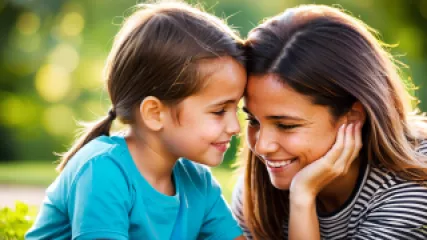Raising Resilient Kids: A Parent's Journey to Supporting Children's Mental Health
As parents, we all want our children to grow up happy and healthy, both physically and mentally. We strive to provide them with the best opportunities and support in every aspect of their lives. One crucial area that often gets overlooked is their mental health and resilience. Building resilience in children is essential for their overall well-being and success in life. In this article, I will share my personal journey as a parent, navigating the challenges of raising resilient kids and supporting their mental health.
Understanding Resilience
Resilience refers to the ability to adapt and bounce back from adversity. It is a skill that helps individuals navigate through life's challenges, setbacks, and stressors. Just like physical strength, resilience can be developed and nurtured in children. By equipping them with the necessary tools and strategies, we can empower our kids to face life's ups and downs with confidence and optimism.
When my child, Avery, was going through a tough time at school, I realized the importance of building resilience. I witnessed the impact it had on their overall well-being and how it helped them overcome difficult situations. This experience ignited my determination to learn more about child resilience and find effective ways to support my child's mental health.
Creating a Supportive Environment
The first step in fostering resilience in children is creating a supportive and nurturing environment. As parents, we play a crucial role in shaping our children's emotional well-being. By providing a safe and loving space, we lay the foundation for their resilience.
I started by cultivating open communication with my child. I encouraged them to express their feelings and thoughts without judgment. This allowed us to have meaningful conversations about their experiences and emotions. Listening attentively and validating their emotions helped build trust and strengthen our relationship.
Another essential aspect of creating a supportive environment is setting clear boundaries and expectations. Consistency and structure provide children with a sense of security and stability. It helps them develop self-discipline and resilience in the face of challenges.
Teaching Coping Strategies
Resilience is not about avoiding adversity but rather learning how to cope with it effectively. Teaching children coping strategies equips them with the skills to handle stress, setbacks, and difficult emotions.
One strategy that worked well for Avery was practicing mindfulness and deep breathing exercises. These techniques helped them manage their anxiety and stay present in the moment. We would often engage in mindful activities together, such as going for nature walks or practicing yoga.
I also encouraged Avery to develop problem-solving skills. Instead of solving every problem for them, I would guide them through the process of brainstorming solutions and evaluating the potential outcomes. This helped foster their critical thinking abilities and empowered them to tackle challenges independently.
Fostering Social Connections
Building strong social connections is a crucial aspect of resilience. Positive relationships with family, friends, and mentors provide children with a support system during tough times.
I encouraged Avery to participate in activities where they could connect with peers who shared similar interests. Joining clubs, sports teams, or community organizations helped them build friendships and develop a sense of belonging. These connections provided a valuable network of support and encouragement.
Furthermore, I emphasized the importance of empathy and kindness towards others. Teaching children to be compassionate not only benefits their own well-being but also strengthens their relationships and social skills.
Seeking Professional Help
While as parents, we can do our best to support our children's mental health, sometimes professional help may be necessary. There is no shame in seeking guidance from therapists or counselors who specialize in children's mental health.
When Avery was struggling with persistent anxiety, we decided to seek professional help. Working with a therapist helped them develop additional coping strategies and gain a deeper understanding of their emotions. It was a positive and empowering experience that made a significant difference in their overall well-being.
Conclusion
Supporting our children's mental health and building resilience is an ongoing journey. As parents, we have the power to shape their emotional well-being and equip them with the tools they need to thrive in life. By creating a supportive environment, teaching coping strategies, fostering social connections, and seeking professional help when needed, we can raise resilient kids who are prepared to face the challenges that come their way.
Inspired by the personal experiences of Lydia Gomez, mother of Avery Banks.






